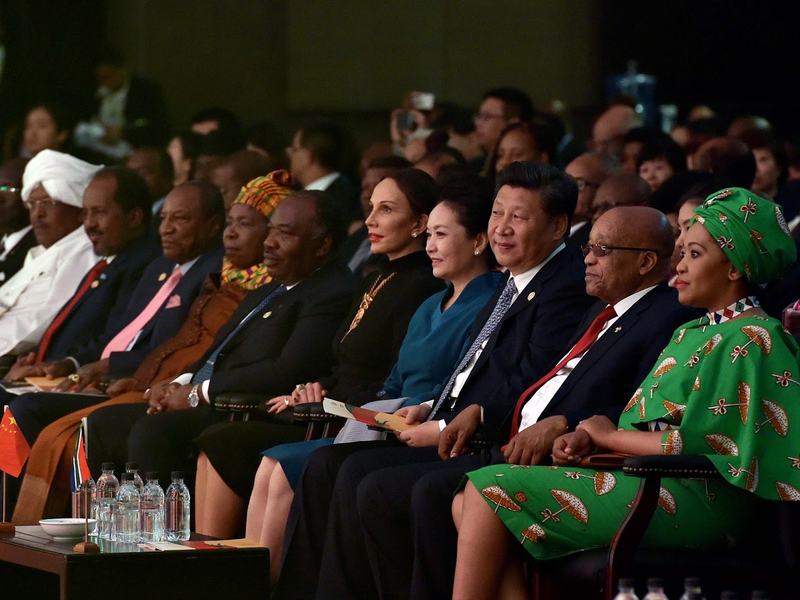(Chinese President Xi Jinping and his wife, former South African president Jacob Zuma, and other African heads of government at a 2015 FOCAC Conference. Image by Government ZA via Flickr https://www.flickr.com/photos/governmentza/23471840112 )
The African continent continues to grapple with devastating underdevelopment. In 2019, the World Bank reported that over 40% of the continent’s population lived below the USD $1.90-a-day poverty line. Some factors to be contributed to this insufficiency include corruption, a lack of infrastructure, and the remnants of European imperialism. European colonization, which occurred on the African continent from the 1880s until the 1970s, took control of African natural resources like palm oil, coffee, cotton, oil, cobalt, and more, and developed host countries while draining Africa.
In efforts to develop modern African countries, many post-colonial states incurred debt from institutions like the World Bank, the International Monetary Fund (IMF), and private institutions, with some loans consisting of high interest rates, low ratings from international agencies, disproportionate currency exchange rates, and mismanagement of funds. However, with the debt, Africa’s lack of progress continues to be undermined by the widespread poverty on the continent. In 2018, the World Bank reported that South Saharan Africa made up two-thirds of the world’s population who lived in extreme poverty.
China, a country that developed its economy from Foreign Direct Investments (FDI), has turned its focus towards high investment in Africa. This phenomenon has raised eyebrows among former colonialists and caused global thought leaders to question the motive of China’s investment. Some even wonder if China is on its way to becoming the next colonial power in Africa.
China’s investments in different African countries have been deemed as “debt traps” by western countries such as the United States, who ironically, have mistreated African countries themselves, economically, politically, and socially. Foreign Direct Investment (FDI) occurs when a business has authoritative ownership of a company or entity in another country. China, who provides the most FDI in Africa, is providing infrastructural development such as the building of roads in exchange for finances and natural resources. The People’s Republic of China (PRC) is utilizing these partnerships as part of its “Going Out” strategy, which encourages investment overseas, and is working to further internationalize their currency, the Renminbi (RMB). Although China has been building edifices in African countries since the 1950s, in the past 30 years, Africa has seen an influx of FDI from the country. In 1980, Africa and China’s trade was estimated at $1 Billion. By 2013, bilateral trade between the two countries rose to $210 billion.
Since 2000, “friendly” African countries and Chinese leaders have been developing partnerships through the Chinese African Forum of Cooperation (FOCAC). FOCAC includes entities like the African Union (AU), and 53 African countries.

(A Chinese-built road in Kenya. Image by Mikenjau via Wikimedia Commons)
There has been some evidence of foul play through China’s work. In 2012, China built the African Union headquarters in Addis Ababa, Ethiopia, as a “gift” to the institution. In 2017, after discovering a spike in data activity during the AU’s off-hours, the AU discovered that China had been spying on all of their information for the past 5 years. Members of the AU, in concern about their long-term projects with China, downplayed the incident, and eventually denied the claims. This espionage strategy has been used by former colonists like Britain and France, who also spied on African leaders to obtain confidential information. As China has built edifices, including governmental buildings in many other parts of Africa, the question of surveillance and political power as ulterior motives comes into clear view.
Other unethical practices in countries like Ghana, where the Chinese participated in “galamsey”, the illegal small-scale mining practice that contributes to the water and air pollution, and Chinese investment-related labor issues and wildlife loss in other African countries, have been the cause of some concern. In Kenya, Chinese companies have been penalized for racist practices like calling Kenyan employees monkeys, using segregated restrooms and producing racist commercials.
If African countries are able to leverage their long-term strategic plans, they may be able to negotiate contract terms with China that will allow African countries to develop from FDI, as China has done. However, Africa’s internal processes, which could include a fresh approach, eliminating corruption, maintaining ownership of resources, and leveraging the infrastructure to produce and export products using natural resources, might determine the continent’s ability to stand on its own feet in the future and compete in the global market.
*Disclaimer- All FDI projects are not freely shared, so figures may not be all inclusive
Click this link to view a table of all investments from China in African countries.
Works Cited
https://www.google.com/amp/s/www.bbc.com/news/world-africa-42861276.amp
https://www.youtube.com/watch?v=ZmNXl5BUp0Q
https://www.cfr.org/blog/african-union-bugged-china-cyber-espionage-evidence-strategic-shifts
https://www.ide.go.jp/English/Data/Africa_file/Manualreport/cia_04.html
https://www.cigionline.org/publications/deeper-look-chinas-going-out-policy
https://www.theigc.org/wp-content/uploads/2016/08/Crawford-et-al-2015-Final-Report-1.pdf
https://www.water-technology.net/projects/bui-dam-hydro-power-ghana
https://www.theigc.org/wp-content/uploads/2016/08/Crawford-et-al-2015-Final-Report-1.pdf
https://www.climatechangenews.com/2016/07/05/iea-china-has-built-a-third-of-africas-power-capacity/
https://www.worldbank.org/en/topic/debt/brief/hipc
https://www.frontiersin.org/articles/10.3389/fevo.2020.579813/full
https://www.diplomaticourier.com/posts/china-s-going-out-strategy
https://au.int/en/partnerships/africa_china
https://jubileedebt.org.uk/wp/wp-content/uploads/2018/10/Who-is-Africa-debt-owed-to_10.18.pdf
http://www.focac.org/eng/ltjj_3/ltffcy/
https://www.youtube.com/watch?v=yhgq7miOBXk&t=479s
https://asq.africa.ufl.edu/files/V19i3-4a3.pdf
https://www.cfr.org/blog/belt-and-road-kenya-covid-19-sparks-reckoning-debt-and-dissatisfaction
https://africacenter.org/spotlight/implications-for-africa-china-one-belt-one-road-strategy
https://www.nytimes.com/2018/10/15/world/africa/kenya-china-racism.html

Nana Ama Addo is a writer, multimedia strategist, film director, and storytelling artist. She graduated with a BA in Africana Studies from the College of Wooster, and has studied at the University of Ghana and Kwame Nkrumah University of Science and Technology. Nana Ama tells stories of entrepreneurship and Ghana repatriation at her brand, Asiedua’s Imprint ( www.asieduasimprint.com ).





